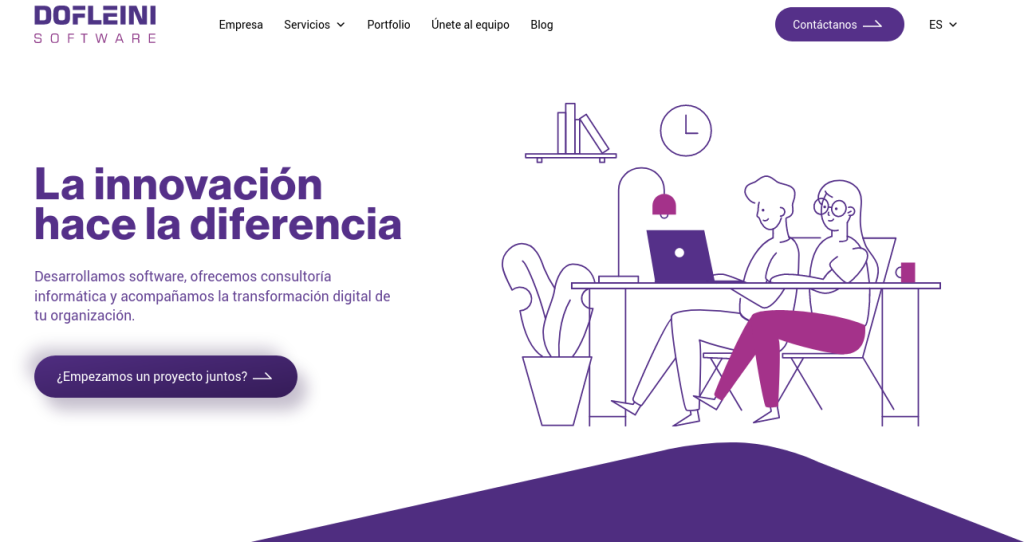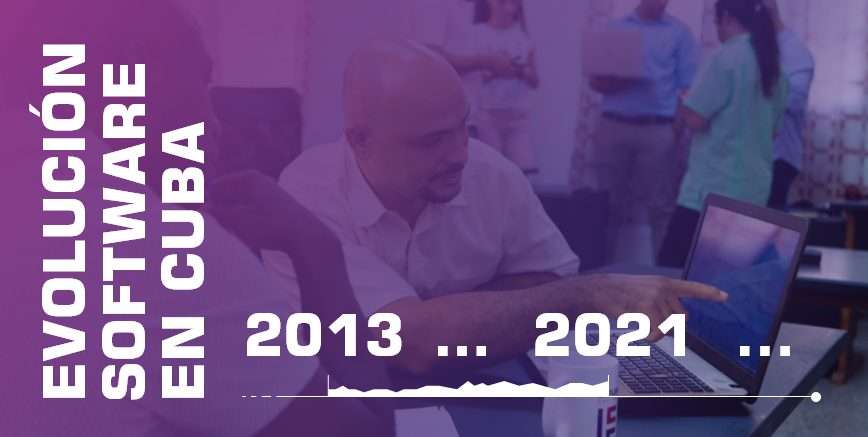Several articles have been published nationally and internationally on what some call the “nascent” private IT sector or software development in Cuba. The truth is that, after reading them, I felt that in many cases they lacked accuracy and nuances, and that is usually achieved with more clarity when you have lived the process you are writing about.
It was the final months of 2013 and in the Official Gazette No. 27 (extraordinary), published on September 26, appeared Resolution No. 42/2013 of the Ministry of Labor and Social Security, which, among others, approved for the first time the self-employed activity of the computer equipment programmer (PEC) in Cuba.
In the section on the description of the scope of the activity, it read:
“Designs, writes or debugs programs for a computer or any information processing equipment, proposes the sequences of instructions or writes the corresponding code.”
It was a complex time for software development in the nascent non-state sector. High Internet prices, with service only accessible from hotels or real estate agencies and offers and rates designed for foreigners; uncertainty, lack of workplaces, lack of access to the web and other factors, did not favor this new economic actor and its insertion in the necessary digital transformation of Cuban society.
At that time, its sphere of action was marked by the provision of technical support services to individuals: installation of operating systems, antivirus and basic programs in PCs of neighbors and acquaintances, or periodic maintenance of equipment.
Small management systems for private businesses, maintenance, installation and development of mobile applications also emerged, although to a lesser extent.
Subsequently, these independent professionals began to group together and organize themselves. Many did so under formal employment contracts, some inserted in other economic forms such as cooperatives (even if not related to their activity), but mostly they grouped under independent licenses.
Some of them already had pseudo-business processes, although there was no formal software development service with organizational, service quality or documentation processes. Under these conditions, it was to be expected that many state-owned companies, objectively, did not want to contract the nascent sector. But it was also evident the clearly subjective refusal to incorporate the PECs to the development of state projects, regardless of the maturity, capacity or experience of the team.
It was a stage characterized by the emergence of ways of “moving” as freelancers, small startups among friends, career acquaintances or programmers with related interests who offered their services in an unfavorable environment to joint ventures, private enterprises and even state entities.
There was an appreciable migration of IT professionals to foreign countries, parallel to an increase in the informal sector. Modest IT management solutions, development of mobile applications and a path towards its recognition as an important part of the informatization process of Cuban society were beginning to be glimpsed.
In 2015, two years after its activity was approved, the sector already showed great potential, with solutions of excellent workmanship, innovation and creativity, at the level of companies from other countries, even developed ones. Hundreds of mobile applications were created and there was a considerable increase in technology-based projects and multidisciplinary teams that were visibly noticeable and successful.
The year 2016 closed with 1 277 registered PECs. In the first quarter of 2017, Havana concentrated more than half of the PECs in the country, with a total of 843 licenses issued, out of a total of 1 432 (data from the National Statistics Office, ONEI).
Most of them were independent workers, but it was becoming more frequent to see teams providing services to foreign companies, in a type of pseudo-legal relationship that allowed them to rent premises in real estate agencies and access the Internet from those spaces, under Article 24 of the TCP regulations, which allowed them to offer services to foreign individuals, without obligations to the Ministry of Foreign Trade and Foreign Investment and with very low prices, compared to those in force in the international or regional market.
This allowed the acquisition of appropriate means of work such as laptops, PCs, cell phones, tablets, among others, which favored the management of these professionals, their updating and articulations, and contributed to boosting the sector.
Self-employed workers received an average income of between 200 and 600 CUC per month. The main sources of income were Cubans abroad, who functioned as intermediaries for other companies or end clients with specific development needs. Other sources of income were nationals, mainly in products and services aimed at other self-employed people in sectors such as tourism, housing rental, gastronomy and art promotion.
To a much lesser extent, there was income from alliances with national companies.
The conditions were also created for a national ecosystem that drove the sector to greater integration in the digital transformation processes in the country.
Some examples are:
- Cuban Informatics Unión (UIC): a civil society organization that brings together professionals in the fields of information technology, automation and telecommunications. It played a fundamental role in the cohesion and private-state alliance. Through a system of activities, it made the solutions and needs of the sector visible.
- Informatics and Communications Workshop for the ICT society: companies were presented to carry out joint projects with non-state workers in the sector and rounds of negotiations between companies and non-state workers, according to the interests of both parties.
It was in this context when, in August 2017, the granting of new licenses for PEC was suspended, along with 26 other activities, until their scope and characteristics were specified in the policy prepared by the Ministry of Communications. However, there was already a significant number of licenses granted that allowed the non-state sector of software development to continue its path towards the digital transformation of Cuban society.
In January 2019, 3G technology began to operate in Cuba (4 GB cost 30 CUC) and the country had 670 navigation rooms. There were more than two million Cubans with accounts for Wi-Fi points and more than 60 000 users accessed from their homes to the internet, through the Nauta Hogar program, according to data offered by Etecsa.
Since then, internet access was increasing, as successive investments in telecommunications infrastructure were developed, taking advantage of the capabilities offered by the submarine fiber optic cable connecting Venezuela, Jamaica and Cuba, known as ALBA-1 and deployed since January 2013, although its direct benefits in the non-state sector and the rest of the population did not become palpable until the end of 2017.
For a brief characterization of the non-state and informal sector between 2019 and the end of 2020, we could highlight that:
- At least 28 established TCP businesses are identified, publicly known and in the format of a business project.
- The intention of these professionals to build a life project in Cuba is perceived.
- There are non-public groups that carry out similar activities from a low profile and oriented to the international market.
- It is predicted that there may be thousands of freelancers performing professional services abroad without a license, a common practice for several years, evidenced by thousands of Cubans registered and offering services through multiple online platforms.
- There is evidence of an increase in informal professional services from universities, labor centers and unlicensed freelancers.
- There is an increase in the migration of professionals, driven by the hiring of foreign companies.
- Poor connectivity and unfavorable working conditions continue.
- It is estimated that the informal export market may be moving between US$8 million and US$10 million per month, for a total of US$100 million per year.
The Cuban government has been working in recent years on updating the state and non-state entrepreneurial model. Regarding the latter, the most recent changes have been associated with updating the exercise of self-employment, limiting the number of people a self-employed worker can hire as workers. The objective is to give it the personal and limited character that has always been sought with this figure, an approach in which there was no room for self-employment associated with professional activities such as software developers.
Legislation has also been passed to update the non-agricultural cooperatives (NAC), which are no longer considered an experiment, but an established figure within the economic actors. However, during the experimental phase, no NAC in the IT sector was approved, since it was not among the areas of the economy prioritized for the experiment. Currently, this limitation does not exist and NACs in the IT sector can be formed.
More recently, on September 20, 2021, a regulatory package came into force that legalizes the creation of micro, small and medium-sized enterprises (MSMEs), under the figure of limited liability commercial companies.
This is the measure with the greatest impact for the sector, since it grants legal personality, one of the greatest demands of the TPCs in the IT sector, now with a business category that allows a more natural and secure relationship with other actors, fundamentally with the Cuban state business sector and the one linked to foreign investment. In addition, MSMEs can now apply to the category of high-tech companies, something that was impossible before, because they were not companies.
MSMEs may be state-owned, private or mixed. The mixed ones, still without legal regulation, are the possibility of creating a company that links private legal entities with state legal entities.
In its intention to promote innovation in Cuban society, the Government has enacted regulations for this purpose, including the granting of the category of high-tech companies, and the creation of the legal framework and operation of scientific-technological parks, with the aim of incubating technology-based projects and companies, applying tax incentives and more expeditious, albeit indirect, access to the export of products and services.
On September 29, the first 35 MSMEs (32 private and three state-owned) were approved as part of the new policy. In the list published that day by the Ministry of Economy and Planning, three of them were Dofleini Software, Lombao Estudios, Ingenius, Edumedia, Guajiritos and Pixel Solutions with “computer programming activities” as their main economic activity.
Then, on October 7, another 67 MSMEs (66 private and one state-owned) and two NACs were approved. On October 13, 60 private MSMEs and four NACs were added. To date, the list of IT and technology-based MSMEs includes companies such as:
Some examples of the private sector software development in Cuba
It develops software for web and mobile applications and business management systems, big data and e-commerce stores. It offers consulting and IT support and accompanies the digital transformation of companies, institutions and organizations.

Professional group of web design and development, online marketing, custom software development, identity design.

Ingenius
A team of highly qualified professionals, integrated by masters in science and engineers in Computer Science and Telecommunications Systems, with vocation and capacity to engineer computer and electronic solutions to technological problems.
Ampersand
IT and design solutions.
Dataplus
Data and security technology solutions company. Provides comprehensive solutions for data networks and security systems that contribute to increase efficiency in the management and operation of private businesses in Cuba.
Business focused on web development, communication and digital marketing, as well as graphic design.
LiangWare
LiangWare is a team of professionals experienced in the analysis and development of customized software solutions. Our main goal is to provide our clients with IT tools perfectly adjusted to the needs and particularities of their business. You as a customer will have with our work one more member for your team, a potentially useful one that will help you to organize, streamline and improve the daily work. With LiangWare you gain a reliable and committed ally.
JYDSolution
Digital marketing agency based in Cuba, specialized in advertising campaigns and SEO, image design, as well as the development of digital platforms.
Videogames creator.

Gemus
Society of expert consultants in the most diverse topics related to business management, mathematicians and specialists in engineering and software development.
Confidere
Business management services using Odoo technology, serving the needs of CRM, accounting, finance, sales, human resources, purchasing, warehousing, e-commerce, marketing, point of sales, among others.
Cuban.Engineer
Software house formed by highly qualified Cuban engineers.
Pyxel Solutions
Multidisciplinary team that specializes in creating products and services related to information technology, communication and design.

Dalovra Solutions
Design and software development agency.
Compuideal
Electronics, networking, software development and maintenance workshop.
Software engineering and development.

Gestar
Support, guidance, economic and accounting management of small and medium-sized companies.
Viamax Consultoria
It assists Cuban and foreign entrepreneurs and businessmen interested in developing projects in the Cuban market.
Web Stack Club
Software development more focused on the web area.
Grupo Carricay
Group of specialists in computing, automation and design.
QvaPro
Team focused on the development of solutions for the labor market and for the follow-up of collaborators in an organization.
Casabe
Application development specialized in HTML5 and mobile solutions.
Simbiosis
Company focused on graphic design, print, advertising, mobile and web application development.
FOX Productions
Graphic design, prints of all kinds, cards, web pages, advertising posters, gigantographies, logos, stickers and decorative vinyls.
Zeros Group
Software development and management, marketing and advertising group.
Starcubandev
Professionals specialized in the development of applications for Android devices.
iaBoots
Company dedicated to the creation of software using artificial intelligence and data mining.
Conoce Cuba
Software application supported on operating systems for Android and iOS mobile devices, being a catalog of products and services.
Cuba APK
Gateway for Cuban mobile applications. First platform for updating and dissemination of applications developed in Cuba.
Online directory of services, where Cuban enterprises in the sector can be promoted and at the same time show the consumer all the offers available for the service they want and that best fits their requirements.

Payment gateway with which you can create your online account in digital dollars and start trading globally, even from .cu.
Encuentre
Digital platform dedicated to e-commerce. It provides tools for buyers and sellers to carry out their transactions in a more effective and organized way.
Lucy
Cuban app for managing personal and business finances. It has a business model related to the sale of goods and cafeteria.
Mandao
App to manage restaurant food delivery services and market and agro-market products.
MiNegocio
App to manage from sales to products.
Lanave
Cuban Uber version to connect passengers and drivers.
In a quick analysis, several conclusions jump out.
The fact that in just a few days, since September 29, so many technology-based MSMEs have been approved, confirms the strength and in many cases the professional maturity of this sector in Cuba, the development of enterprises -virtual projects of companies until recently, now with legal status- that already had a long history, with experience in services and innovation for entities in various sectors and with top-level specialists, trained in Cuban universities and with a mastery of the latest trends and resources in this industry.
Incorporated as companies, with the legal, service access and financial security provided by the legal personality, many of these groups can continue their development, improve their management and give visibility, in the short or medium term, to a Cuban software industry with active insertion in the Cuban economic and social program and, at the same time, with a wide exportable potential that would represent income for the nation.
A sector identified with the country’s project and at the same time profitable, competitive and innovative, which would be established as another proof of how much the knowledge economy can give to Cuba.
From now on, we will have to be attentive to how the formation of these MSMEs, specifically the IT and technology-based ones, will influence the phenomena that have marked recent years and that we mentioned before: Will ICT services and exports improve and increase? Will the migration of professionals in the sector decrease?
What is certain is that private MSMEs, and in their operation before September 29 many of these groups have demonstrated it, do not have to be seen as a danger for the state enterprise.
They are a complement and an economic actor that can forge alliances with the state sector and that, in addition to being necessary, can be very committed to the success of projects of economic and social scope.
They can have positive impacts, due to their flexibility, specialization and management scale, in key areas that include not only exports, but also the digital transformation of Cuban society, the advance to more efficient processes that contribute to the well-being of citizens and local development.
Today, the possibility of appreciating Cuban industry and economy as a whole is open, a scenario in which diverse economic actors (state, private, cooperative, large and small) converge, which can link up, ally, establish mutually beneficial relationships that improve the operation and numbers of each one and, at the same time, contribute to national growth.
In the case of IT and technology-based MSMEs, there is an indisputable fact: their main capital, knowledge, is generated in Cuba.
There is a favorable national context for the development of these companies, so that they can unfold their potential and contribute to the economy. At the same time, challenges and obstacles remain, among them the persistence of bureaucratic burdens and limitations in the areas of foreign trade, operations and banking, in an environment of economic imbalances and crisis at national and international level.
But, undoubtedly, 2021 closes with a change that we have been looking for for a long time. Now, it remains for us to demonstrate that we are ready for change, and to navigate between challenges and opportunities.
